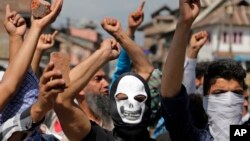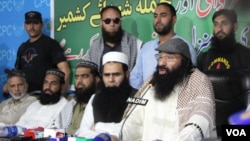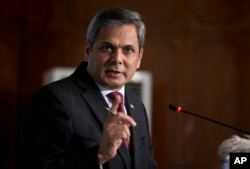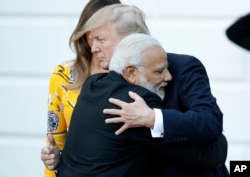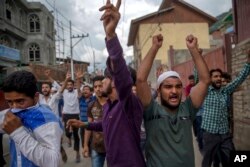India scored a major diplomatic victory over Pakistan earlier this month when the United States designated the largest militant group fighting against Indian rule in the divided Kashmir region as a “foreign terrorist” organization.
For India, the terror label on the banned Hizbul Mujahideen, or HM, is a strong affirmation of its argument that the violence in its only Muslim majority region is fueled by Islamic militant groups that operate from Pakistan, what India has long called “cross-border terrorism.” Islamabad denies the charges.
HM was established in 1989 when the insurgency erupted in India-administered Kashmir. The United States declared its founder and supreme commander, Syed Salahuddin, a global terrorist in June.
India says the designations reflect the joint commitment of New Delhi and Washington to fight terrorism.
New Delhi accuses the Hizbul Mujahideen, along with other Islamic militant groups, of killing thousands of people since the armed separatist rebellion erupted in Kashmir.
“They are repeatedly attacking civilian targets, killing civilians through acts of indiscriminate violence and sometimes targeted acts of violence,” said Ajai Sahni, who heads the Institute of Conflict Management in New Delhi. He says there is a large database of such attacks and the reason the United States has designated HM a terror group.
Pakistan rejects designation
Pakistan’s Foreign Ministry and Salahuddin, who operates out of the Pakistani-administered part of Kashmir, have rejected the terror designation as unjustified.
Pakistani foreign ministry spokesman Nafees Zakaria said Pakistan and India have disputed claims over Kashmir for the past 70 years, and there have been U.N. Security Council resolutions pending implementation for decades.
Pakistani authorities and Kashmiri leaders maintain the armed insurgency is an “indigenous, political and legitimate” struggle of Kashmiris strictly confined to the Himalayan region with a mission to free Kashmir from Indian occupation.
Dismissing Islamabad’s argument, Indian foreign ministry spokesman Raveesh Kumar said, “all of us are aware of what kind of terrorist activities they have conducted in Jammu and Kashmir and frankly the statement made by Pakistan is very strange to say the least.”
US step toward India
Analysts say the terrorism designation of HM is another significant step President Donald Trump’s administration has taken to politically and diplomatically align itself with India. They also see it as a major blow to diplomatic efforts by Pakistan in the past year to internationally project alleged atrocities Indian security forces have unleashed against innocent Kashmiris.
“My sense is that America’s decision to designate this group as a terrorist organization is a very strong indication of Washington’s desire to take the relationship with India forward in a big way,” said Michael Kugelman of the Washington-based Woodrow Wilson Center.
Hizbul Mujahideen’s Salahuddin, a 71-year-old former school teacher in Indian Kashmir, also heads the United Jihad Council, or UJC, an alliance of more than a dozen Pakistan-based Kashmiri militant groups.
“They (U.S.) cannot quote a single incident to prove that we are terrorists,” he said, responding to the U.S. move declaring him a global terrorist. “This idiocy can neither weaken our courage, nor stop the freedom struggle and the target-oriented actions of freedom fighters,” he vowed.
Pakistani militant organizations, Lashkar-e-Taiba, Jamaatud Dawa and Jaisha-e-Mohammad have also allegedly been supporting insurgent activities of HM and UJC, and participating in cross-border attacks, in addition to raising funds in Pakistan for the jihad in Kashmir.
New Delhi has long accused the Pakistani spy agency of funding and backing the militants and demanded Islamabad help stop the violent campaign against India.
Islamabad denies allegations it is providing any material support to insurgents, insisting it only offers “diplomatic, political and moral” support to the legitimate struggle of Kashmiris for their right of self-determination under a U.N.-promised plebiscite.
Renewed Kashmiri violence
The terror designation for Hizbul Mujahideen comes at a time of renewed violence after a decade of relative peace in Kashmir that followed a 2003 cease-fire between India and Pakistan.
During that time, the group’s presence in Kashmir had shrunk, but the last year has seen a resurgence of militancy, with the Hizbul emerging as the largest group in the Himalayan region.
The response to the terror designation for Hizbul is more mixed in Kashmir, where people say they do not support violence but offer no clear-cut answer as to whether the group should be viewed as freedom fighters or terrorists.
The current wave of unrest erupted after Indian security forces killed the group’s charismatic local commander, Burhan Wani. Since then, thousands of ordinary Kashmiris have taken part in anti-India street protests.
Label not justified
A prominent separatist leader in Indian Kashmir, Mirwaiz Umar Farooq, sees no justification for the terror label.
Pointing out that there are now an estimated 100 local recruits in the ranks of the Hizbul, he said “there is an indigenous aspect to the Kashmiri militancy, and the young boys who have joined militancy today are those who feel pushed to the wall. Most of them have been subjected to repression, families have been harassed by the police.”
He added, “they don’t have any global agenda like the al-Qaida or the Taliban, or the Islamic State. Their focus has been mainly vis-a-vis the Kashmir issue.”
Indeed, for many in Kashmir, the main grievance is New Delhi’s failure to explore a political solution to the Kashmir dispute and alleged human rights violations by Indian security forces amid what many regard as heavy-handed efforts to stamp out militancy and control protests.
Recent border skirmishes between Pakistani and Indian militaries along the Line of Control dividing Kashmir also stem from the agitation in the disputed territory amid allegations Islamabad is fueling the street protests. The cross-border clashes have left many soldiers and civilians dead on both sides over the past months.
Given that the Hizbul Mujahideen is focused on fighting India’s rule in Kashmir and enjoys support among Kashmiris, activists and militants do not foresee any disruptive effect on the organization in the wake of U.S. terror label, raising fears a spike in insurgent violence could trigger a wider conflict between India and Pakistan.




